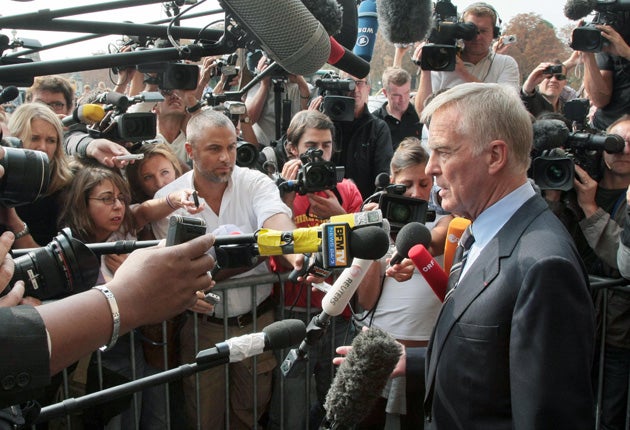David Tremayne: Teams are in driving seat – and Mosley knows it all too well
The FIA was mindful that a long ban would drive another manufacturer out of the sport

Your support helps us to tell the story
From reproductive rights to climate change to Big Tech, The Independent is on the ground when the story is developing. Whether it's investigating the financials of Elon Musk's pro-Trump PAC or producing our latest documentary, 'The A Word', which shines a light on the American women fighting for reproductive rights, we know how important it is to parse out the facts from the messaging.
At such a critical moment in US history, we need reporters on the ground. Your donation allows us to keep sending journalists to speak to both sides of the story.
The Independent is trusted by Americans across the entire political spectrum. And unlike many other quality news outlets, we choose not to lock Americans out of our reporting and analysis with paywalls. We believe quality journalism should be available to everyone, paid for by those who can afford it.
Your support makes all the difference.So why weren't Renault banned, if the World Motor Sport Council said that they considered their breaches relating to the 2008 Singapore Grand Prix "to be of unparalleled severity"? And that they "not only compromised the integrity of the sport but also endangered the lives of spectators, officials, other competitors and Nelson Piquet Jnr himself?"
It's an interesting question. And one might speculate whether, say, McLaren would have been treated so leniently in similar circumstances.
But this was one instance in which the FIA, via the WMSC, did exactly the right thing. They weighed the relative values of the Renault F1 team and Flavio Briatore, and clearly decided that while one had considerable merit, the other had none.
Ever since Briatore and his sidekick Pat Symonds were obliged to walk the plank last Wednesday, Renault F1 made it very clear that they were not going to try and justify the behaviour of their managers in Singapore last year. And they entered several pleas of mitigation.
They had accepted, at the earliest practicable opportunity, that they had committed the offences with which they were charged and cooperated fully with the FIA's investigation. They had confirmed that Briatore and Symonds were involved in the conspiracy and kicked them out of the team.
They apologised unreservedly to the FIA and to the sport for the harm caused by their actions. They committed themselves to paying the costs incurred by the FIA in its investigation; and Régie Renault, Renault F1's parent company, undertook to make a significant contribution to the FIA's safety-related projects. All that, of course, was to be expected of a company keen to put a highly embarrassing situation behind it.
At the same time, the FIA, presided over by Max Mosley, was mindful that a lengthy ban would almost certainly drive yet another manufacturer from the sport. First Honda quit last December, then BMW announced in August that they were quitting, and last Tuesday they signed a deal with the Qadbak company to sell their team. Toyota continue to prevaricate, and show every sign of following them.
Renault have always said that they would remain in Formula One so long as they had a chance of winning, and the failure to do so last year was one of the key factors in the cheating scam that Briatore and Symonds cooked up in Singapore. Renault are still not committed fully to the future of the team, but are likely to do so around a heavily revised structure. That is good news for the sport, and the 700 people who depend on the F1 team in Enstone for their livelihoods. And it should be good news for Red Bull and Williams, who are expected to use Renault engines in 2010.
There is also a rightness in the decision, insofar as the right people got punished. It is clear from the FIA evidence that the circle of those involved in the scam was very small: Briatore, Symonds and Piquet Jnr.
It is also clear that the FIA's spotlight has been on Briatore all along, in a quest to clean up the sport's image, and his motor racing empire has now been well and truly shattered. He is not just expelled as Renault's team principal, but his lucrative sideline business of driver management is in tatters too as pilots such as Fernando Alonso, Red Bull's Mark Webber, McLaren's Heikki Kovalainen and Renault's Romain Grosjean now find their contracts with him – some worth as much as 50 per cent of their salaries – voided by his inability to fulfil their conditions.
The WMSC wanted to hit him where it hurts, and it indeed landed a body blow that may have further ramifications. The Football League is now likely to look at whether his QPR directorship satisfies their "fit and proper persons' test" governing club directors, under the rule that nobody can be a director or hold a majority interest in a club if they are "subject to a ban from a sports governing body relating to the administration of their sport".
One question remains, given what happened yesterday and the severity of the punishments meted out. And that is, why did the FIA not seek to initiate its own investigation into the matter last November, when Nelson Piquet Snr informed it at the Brazilian GP what had happened?
Join our commenting forum
Join thought-provoking conversations, follow other Independent readers and see their replies
Comments